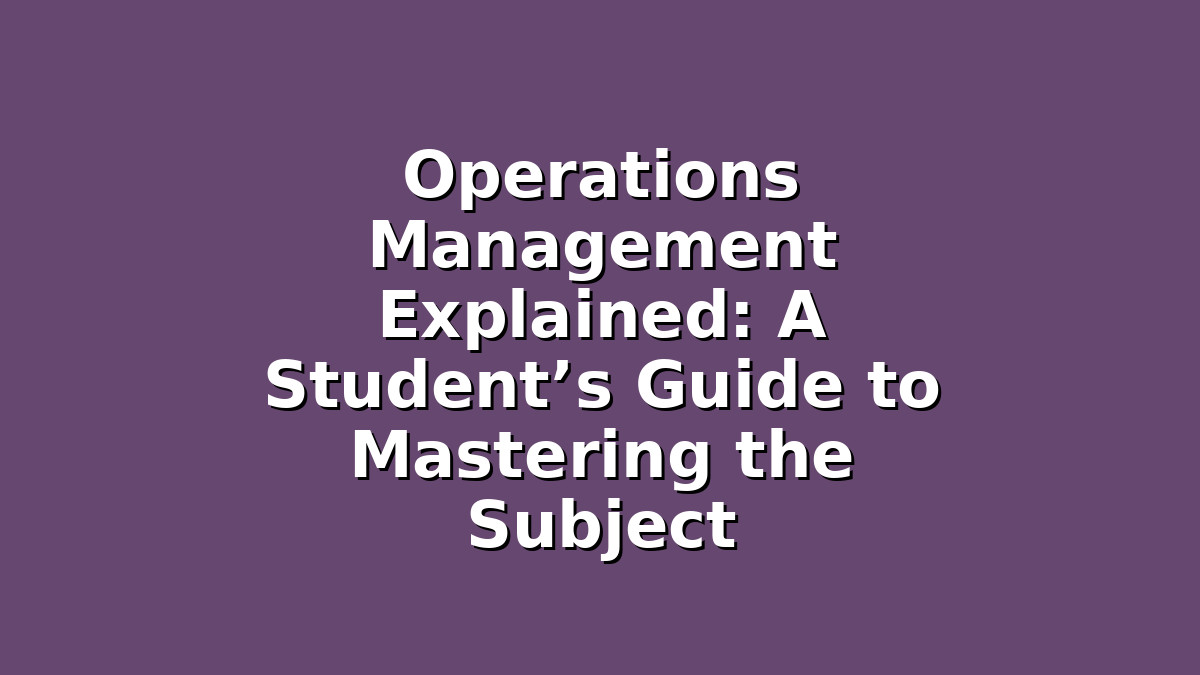If you’re a student preparing for exams or simply trying to get a better grasp of business-related subjects, understanding Operations Management (OM) is crucial. Whether you’re studying business administration, management, or any course where efficiency and productivity matter, Operations Management plays a vital role in the way organizations function. This blog post will break down the essentials of Operations Management and provide you with practical study tips to help you excel in your exams. Let’s dive in!
What is Operations Management?
Operations Management is the administration of business practices to create the highest level of efficiency possible within an organization. It involves planning, organizing, and supervising processes, and making necessary improvements for higher profitability and productivity. Simply put, OM is about managing the resources and processes that produce goods and services.
For students, understanding OM means grasping how companies organize their workflows, manage supply chains, optimize production schedules, and ensure quality control. This knowledge can be applied in case studies, exams, and even real-world projects.
Section 1: Key Concepts of Operations Management You Need to Know
Before you start studying, it helps to break down the main building blocks of Operations Management. Below are three critical concepts that often appear in exams:
1. Process Design and Analysis
This involves how products or services are created, from start to finish. Students should understand process mapping, workflow analysis, and how to identify bottlenecks. Being able to draw and analyze process flow charts can save you a lot of exam time.
2. Capacity Planning and Facility Layout
Capacity planning is about determining the production capability needed to meet demand. Facility layout relates to the physical arrangement of resources. Knowing these concepts helps you answer questions about maximizing efficiency and reducing costs.
3. Inventory and Supply Chain Management
Managing inventory involves controlling raw materials, work-in-progress, and finished goods to minimize costs while meeting customer demands. Supply chain management extends this idea by coordinating suppliers, manufacturers, distributors, and retailers.
#### Study Tip:
Create flashcards for these concepts with definitions, examples, and key formulas. This aids memorization and quick review before exams.
Section 2: How to Study Operations Management Effectively
Operations Management is a subject that combines theory with practical applications. Here are some targeted study strategies to help you succeed:
1. Use Real-Life Examples
Relate theoretical concepts to real companies or situations. For example, think about how Amazon manages its supply chain or how a fast-food chain optimizes its service process. Applying concepts to familiar businesses makes them easier to remember.
2. Practice Problem-Solving
Many OM exam questions ask you to solve numerical problems, such as calculating Economic Order Quantity (EOQ), utilization rates, or cycle times. Practice these calculations regularly and understand the logic behind them rather than just memorizing formulas.
3. Join Study Groups
Discussing topics with peers allows you to see different perspectives and clarify doubts. Teaching a concept to someone else is also one of the most effective ways to reinforce your knowledge.
4. Use Visual Aids
Charts, graphs, and diagrams are integral to understanding processes and data in OM. Practice drawing these during your study sessions. Visualizing concepts like supply chains or capacity utilization improves retention and comprehension.
#### Study Tip:
Set a weekly schedule that alternates between reading theory, solving practice questions, and group discussions to cover all learning styles.
Section 3: Exam Preparation and Stress Management Tips
Preparing for an Operations Management exam can feel overwhelming, but with the right approach, you can manage your time and stress effectively.
1. Break Down Your Study Sessions
Instead of cramming, study in focused blocks of 25-30 minutes with short breaks in between (Pomodoro Technique). This keeps your concentration sharp and reduces burnout.
2. Create Summary Notes
Condense your notes into key points, formulas, and diagrams. Use bullet points and highlight important terms. This will help you when revising closer to exam day.
3. Practice Past Papers
Doing past exam questions under time constraints helps familiarize you with the exam format and identify your weak areas. Review your answers critically to learn from mistakes.
4. Stay Positive and Take Care of Yourself
Confidence plays a big role in exam performance. Maintain a healthy routine with enough sleep, exercise, and good nutrition. If you feel anxious, try deep breathing or mindfulness exercises to calm your mind.
5. Reach Out for Help When Needed
Don’t hesitate to ask teachers, tutors, or classmates if you’re stuck on a concept. Sometimes a little clarification can make a big difference.
#### Study Tip:
Keep a “study journal” where you note what you’ve learned, questions you have, and progress made. Reflecting on your journey helps keep motivation high.
Conclusion
Operations Management might seem complex at first, but with consistent study and the right approach, you can master its concepts and excel in your exams. Focus on understanding core ideas like process design, capacity planning, and supply chain management. Use real-world examples and practice problems to deepen your understanding. Most importantly, adopt effective study habits and take care of your well-being to perform at your best.
Remember, every expert was once a beginner. Stay curious, stay organized, and keep pushing forward—your hard work will pay off!
—

Responses